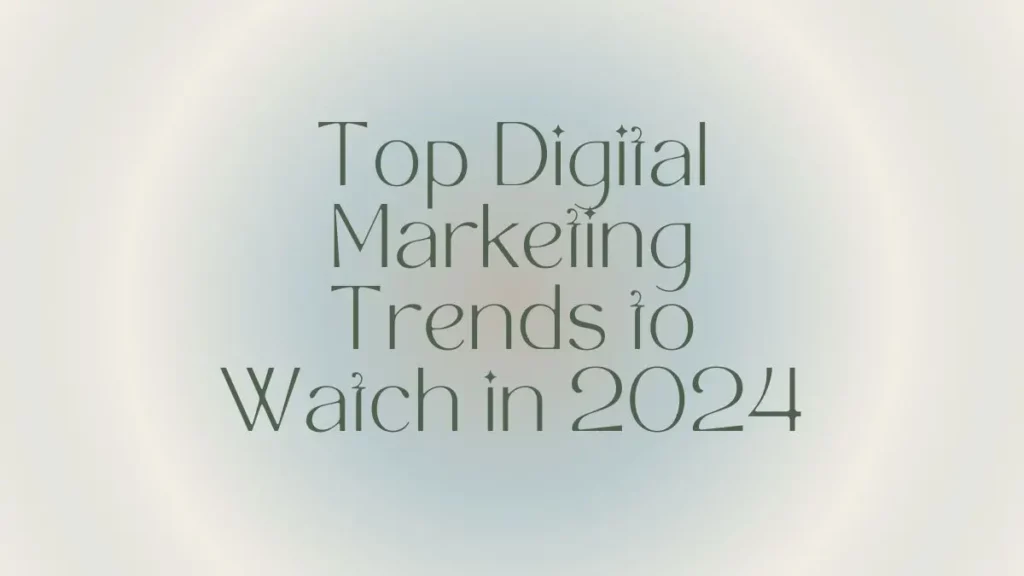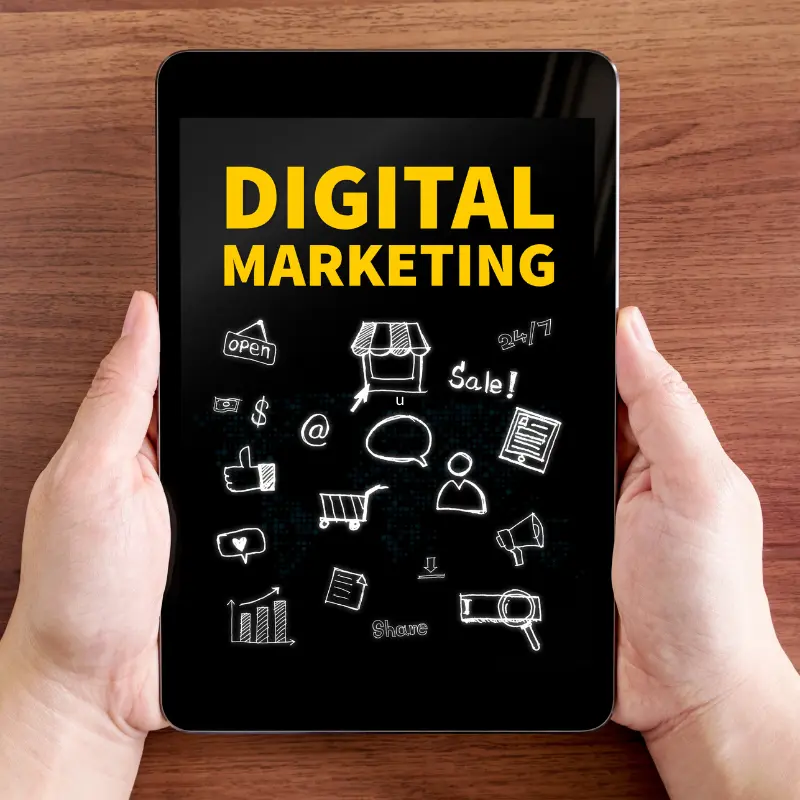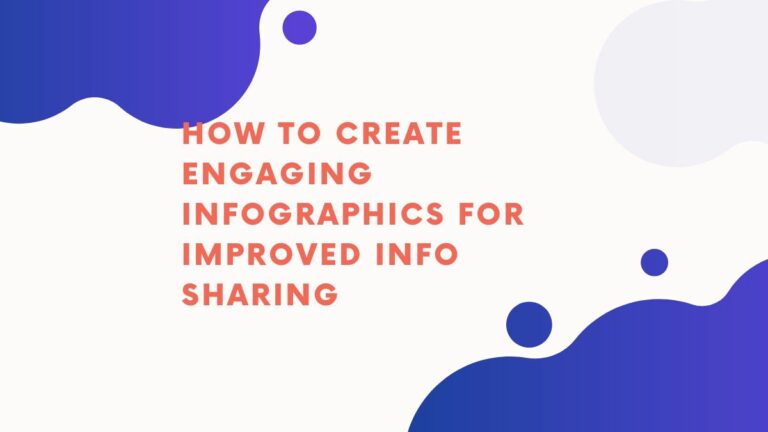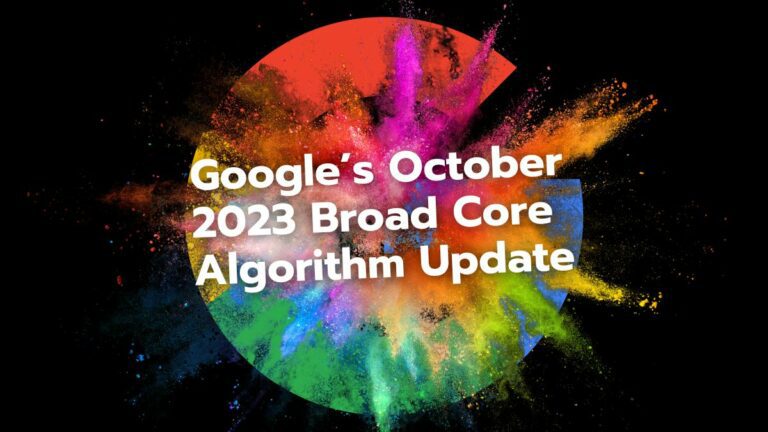
Top Digital Marketing Trends to Watch in 2024
As we dive into 2024, the digital marketing landscape is evolving with exciting new trends. These trends shape marketing strategies and redefine how businesses connect with their target audience. From leveraging AI to personalized experiences, understanding these trends is critical to developing a successful digital marketing strategy. Here, we explore the top digital marketing trends 2024, offering essential 2024 marketing tips for businesses looking to excel.
Social Media Platforms Evolve
In 2024, social media platforms have undergone significant transformations, becoming more sophisticated and integral to digital marketing strategies. The introduction of advanced features, such as augmented reality filters, AI-driven content recommendations, and enhanced e-commerce integrations, characterizes the evolution of these platforms. These features are designed to foster real-time engagement and provide enriched customer experiences.
For businesses, this evolution means rethinking their social media marketing approach. It’s no longer just about posting regular content but leveraging these advanced features to engage with the target audience more interactively. This includes using AI to understand customer preferences, creating immersive AR experiences to showcase products, and utilizing social commerce features to streamline purchasing directly within the platforms.
These platforms focus on real-time content, like live streaming and stories, allowing businesses to connect with their audience more authentically and quickly. This trend emphasizes the importance of real-time interaction, allowing brands to show a more human side and build a stronger emotional connection with their audience. The key is staying updated with these evolving features and understanding how they can be integrated into your marketing strategy to reach and engage your target audience effectively.
The Rise of Influencer Marketing

Influencer marketing in 2024 has evolved beyond simple endorsements. It’s about fostering genuine connections and building trust between the influencer, their audience, and the brand. The rise of micro-influencers is a testament to the changing dynamics of this trend. Micro-influencers cater to niche audiences, unlike their high-profile counterparts, offering more authentic engagement and higher trust levels.
Marketers increasingly collaborate with these micro-influencers to leverage their credibility and relatability. These influencers typically have a deeper understanding of their audience’s needs and preferences, allowing for more targeted and effective marketing campaigns. Their recommendations are often seen as more genuine, which significantly impacts consumer behavior and drives higher conversion rates.
Moreover, influencer marketing is no longer just about social media posts. It encompasses a range of content formats, including vlogs, podcasts, and even virtual events. Brands and influencers co-create informative and entertaining content, enriching the customer experience. The key to successful influencer marketing in 2024 is choosing influencers whose values align with your brand, ensuring their message resonates authentically with your target audience.
Personalized and Automated Email Marketing
Email marketing in 2024 has seen a significant shift towards personalization and automation, driven by advanced AI and machine learning technologies. Today, businesses are not just sending generic email blasts to their mailing list. Instead, they use sophisticated algorithms to analyze customer data and deliver highly personalized email content tailored to individual preferences and behaviors.
This level of personalization ranges from addressing customers by their names to recommending products based on their browsing and purchase history. The integration of AI has enabled the automation of these personalized emails, allowing businesses to send them at the optimal time for each recipient, increasing the likelihood of engagement and conversion.
Furthermore, email marketing has become more interactive. Emails now often include dynamic content like videos, interactive polls, and surveys, which not only engage the customer but also provide valuable insights for future marketing strategies. Automation tools also help segment the audience based on various criteria, ensuring the content is relevant to each group.
The success of email marketing in 2024 hinges on striking the right balance between automation and personalization. While automation increases efficiency, personalization enhances relevance. The challenge for marketers is to use these tools to create email campaigns that feel personal and timely, fostering a deeper connection with their audience.
Conversational Marketing and Customer Service
Conversational marketing and customer service took center stage in 2024, revolutionizing how businesses interact with customers. This trend is about creating a dialogue with customers through various channels like chatbots, messaging apps, and social media platforms. The focus is real-time, personalized interactions, making customers feel heard and valued.
The rise of AI-powered chatbots has been a game-changer in this domain. These chatbots can handle various customer queries, from providing product information to assisting with purchases. They are available 24/7, offering immediate responses to customer inquiries. This is crucial in today’s fast-paced digital environment, where customers expect quick and efficient service.
Moreover, conversational marketing is not just limited to customer service; it extends to the entire buyer’s journey. Businesses can gather valuable insights into their preferences and pain points by engaging customers in a conversation. This information can further personalize the marketing strategy, ensuring that the offerings align with what the customers are looking for.
Effective conversational marketing requires a seamless integration of technology and human touch. While AI can handle routine inquiries, complex queries may require human intervention. The key is ensuring a smooth transition between AI and human agents and maintaining a consistent, high-quality customer experience.
Voice Search Optimization?
Voice search optimization has become a cornerstone of digital marketing over the last few years, driven by the ubiquity of smart speakers and voice assistants like Amazon Echo & Alexa devices and Google Home. As more consumers turn to voice search for convenience, marketing agencies adapt their content creation and SEO strategies to align with this trend.
In 2024, optimizing for voice search involves focusing on conversational keywords and phrases, as voice searches have become how people are more naturally searching than text queries. This requires a deep understanding of how the target audience speaks about your products or services in everyday language. Content must be crafted to answer users’ questions and solve problems in a conversational tone, making it more likely to be picked up in voice search results.
Additionally, local SEO has become increasingly important in voice search optimization. Many voice searches are local, as users look for nearby businesses or services. Therefore, ensuring that local listings are accurate and complete with up-to-date contact information and business hours is crucial.
Voice search optimization is not just about being found; it’s about providing users with a seamless and helpful experience. Brands that successfully adapt to this trend will improve their visibility in voice search results and enhance their overall customer engagement and trust.

Content Creation with a Focus on Video
In 2024, video content continues to dominate the digital landscape, affirming the adage that ‘content is king.’ Video marketing has evolved into an indispensable tool for engaging audiences, with a significant shift towards both short-form and long-form content.
Short-form videos, popularized by platforms like TikTok and Instagram, are perfect for capturing the dwindling attention spans of audiences. They are often more casual and spontaneous, making them more relatable and shareable. Brands leverage these platforms to create bite-sized, engaging content that tells a story, showcases a product, or entertains, increasing brand visibility and engagement.
Long-form video content, on the other hand, is being utilized on websites and YouTube to provide in-depth information. These videos include tutorials, product reviews, webinars, and behind-the-scenes footage, offering value to the audience and strengthening the brand’s authority and trustworthiness.
High-quality production, storytelling, and emotional connection are essential to successful video marketing. Videos that tell a story evoke emotions and resonate with the audience’s values and interests tend to perform better. As a result, brands are investing in creative storytelling and innovative video techniques to captivate and maintain their audience’s attention, thereby boosting engagement rates and brand loyalty.
Leveraging AI for Marketing Insights
Artificial intelligence (AI) will become a game-changer in digital marketing in 2024. AI technologies are not just futuristic tools but practical solutions that drive marketing insights and decision-making.
One of the primary uses of AI in marketing is predictive analytics. AI algorithms can analyze large data sets to predict future consumer behaviors and trends. This allows marketers to anticipate market changes and customer needs, helping them to be proactive rather than reactive in their strategy.
AI is also revolutionizing content personalization. AI can tailor content, product recommendations, and even marketing messages to each user by analyzing individual user behaviors and preferences. This level of personalization enhances the customer experience, increases engagement, and drives conversions.
AI automates repetitive and time-consuming tasks like data analysis, customer segmentation, and even basic customer inquiries. This automation frees marketers to focus on more strategic and creative aspects of marketing, such as brand storytelling and customer experience design.
The effective use of AI in marketing provides deeper insights and efficiencies. It helps build more meaningful and personalized customer relationships. As AI technology advances, its role in shaping and driving marketing strategies is set to become even more significant.
Building Trust through Transparency

In 2024, consumer awareness and concern over data privacy and security have reached new heights. Building trust through transparency in this environment is ethical and essential for maintaining customer loyalty and brand reputation.
Digital marketing strategies now prioritize clear and honest communication about collecting, using, and protecting customer data. This transparency is crucial in an era where consumers are increasingly skeptical of data misuse. Brands that are open about data practices and adhere to ethical standards are likelier to earn and retain customer trust.
Implementing strict data privacy regulations globally has made transparency a legal requirement. Brands must ensure compliance with laws like GDPR and CCPA, which empower consumers to have more control over their data. This involves obtaining explicit consent for data collection and providing easy access for consumers to view, edit, or delete their personal information.
Building trust also extends to marketing communications. Brands are adopting a more authentic and relatable tone in their messaging, avoiding overhyped claims and focusing on genuine value propositions. Engaging with customers through regular, open dialogues, whether through social media, email newsletters, or customer forums, helps establish a relationship based on trust and mutual respect.
Personalized Experiences at Every Touchpoint
Personalization has become the cornerstone of digital marketing in 2024, moving beyond generic marketing messages to creating unique experiences for each customer. This trend recognizes that every customer interaction, from the first website visit to post-purchase follow-up, is an opportunity to provide a personalized experience.
Advanced data analytics play a crucial role in enabling this level of personalization. By analyzing customer data, brands can gain insights into individual preferences, browsing behaviors, and purchase history. This information is then used to tailor marketing messages, product recommendations, and user interfaces to match the individual customer’s interests and needs.
Personalization also extends to content marketing and advertising. Customized content that resonates with customers’ experiences and interests leads to higher engagement and loyalty. Similarly, personalized ads that align with the customer’s current needs and life stage are more likely to convert.
The key to effective personalization is not just about using the right technology but also understanding the customer’s journey and pain points. Brands that successfully implement personalization at every touchpoint can create more meaningful and lasting customer relationships, increasing loyalty and higher lifetime value.
Real-Time Engagement and Interaction
Real-time engagement and interaction have become pivotal in digital marketing strategies in 2024. This trend is about instantaneously connecting with customers and providing immediate responses and interactions through various digital channels.
Social media platforms have become arenas for real-time engagement, with features like live streaming, stories, and direct messaging enabling brands to interact with their audience spontaneously and authentically. These real-time interactions are not just limited to promotional content but include Q&A sessions, behind-the-scenes glimpses, and live events, fostering a sense of community and belonging among the audience.
Real-time customer service is another critical aspect of this trend. Customers expect quick and efficient responses to their inquiries and issues. Utilizing chatbots and messaging apps for instant customer service interactions meets these expectations and enhances the overall customer experience. This immediacy in customer service resolves problems quickly and demonstrates the brand’s commitment to customer satisfaction.
Moreover, real-time engagement is increasingly used to gather customer feedback and insights. Engaging with customers immediately after a purchase or interaction provides valuable feedback that can be used to improve products, services, and customer experiences.

Navigating the Future of Digital Marketing
The digital marketing landscape in 2024 is dynamic and requires businesses to be adaptable, innovative, and customer-focused. By embracing these key trends, companies can create effective digital marketing strategies that resonate with their target audience and drive growth. As we continue to navigate these trends, we should always focus on delivering value and building meaningful connections with consumers.
Digital Results would be happy to help you with your digital marketing needs. Get in touch for a free 30-minute consultation—one of our experts will walk through how we can help optimize your search engine optimization (SEO).
Ready to Grow Your Search Engine Results?
Let Digital Results assist you in your SEO strategy and help
deliver the search engine results you need.






